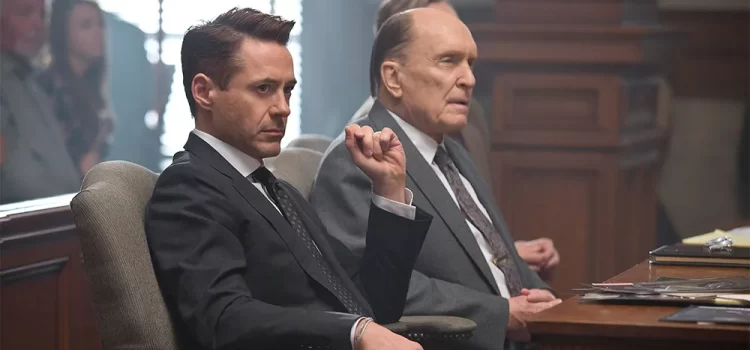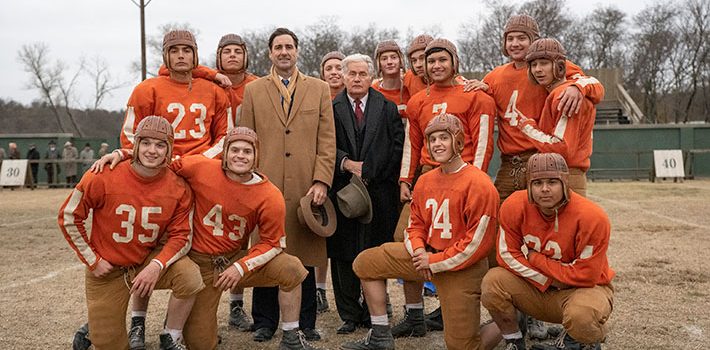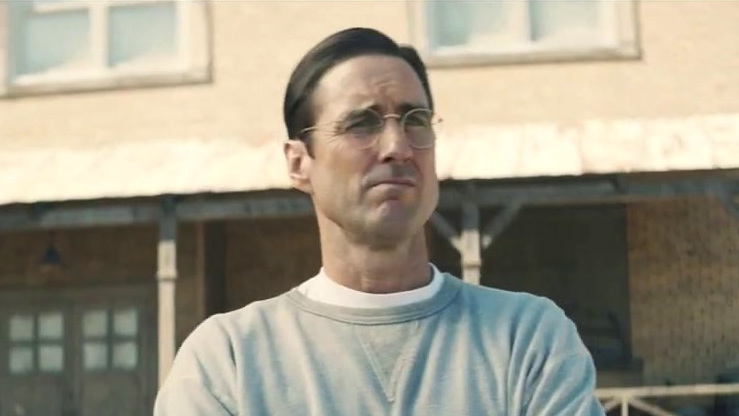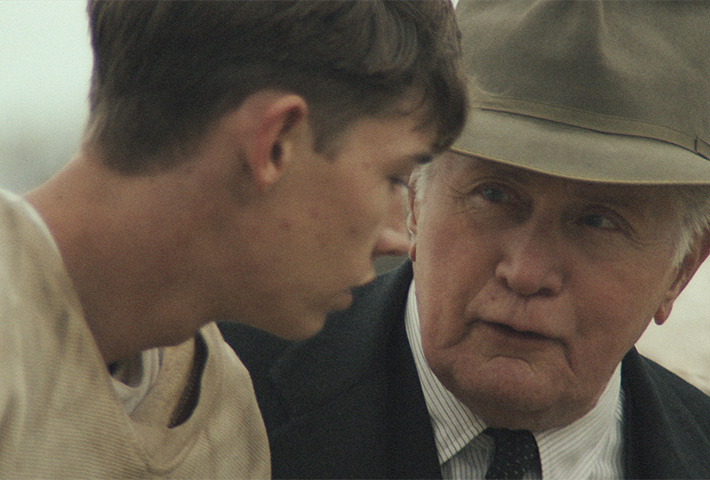Editor’s note: This review originally appeared in the Belleville News-Democrat on Oct. 10, 2010. We are running this review because of its resurgence streaming on Netflix.
By Lynn Venhaus
For the News-Democrat
What It’s About: In a clash of acting titans, two powerhouses go mano a mano in “The Judge,” an over-stuffed yet unpredictable dysfunctional family-legal drama.
Oscar winner Robert Duvall (“Tender Mercies”) is a respected judge who squares off with his estranged son Hank, played by Oscar nominee Robert Downey Jr. (“Tropic Thunder”), who reluctantly oversees his defense during a murder trial.
Hank is a slick Chicago lawyer who reunites with his small-town Indiana family after his mother dies. His older brother Glen (Vincent D’Onofrio) was a promising ball player whose career prospects were cut short after an accident. His younger brother Dale (Jeremy Strong) is a developmentally disabled adult living at home.
The tension is thick, underlining simmering resentments and long ago cold shoulders. You’ll find out why when we head into the courtroom, when the cantankerous dad is accused of a hit-and-run accident he doesn’t remember.
Performances: The joy of watching Robert Duvall create an authentic senior citizen to add to his august body of work is reason enough to see this relentlessly hyped film. Add the always electric Robert Downey Jr. and sparks fly.
Since “Iron Man” in 2008, Downey has spent considerable time being action hero Tony Stark, a great screen presence with his jocular manner and rapid-fire verbal riffs. He carries off sarcastic humor like few can, and you know he will make you laugh.
But the guy has serious acting chops. Since his first Oscar nomination for “Chaplin” in 1992, he left the Brat Pack movies behind, and has delivered interesting work (“Zodiac,” “The Soloist,” “Wonder Boys”), fulfilling the promise of his breakout “Less Than Zero” (1987).
So, “The Judge” is one of his smart roles, a touch of scoundrel, but also a smidgeon of the lost boy. The only drawback is that he talks so fast during frequent motor-mouth deliveries that he can’t always be understood.
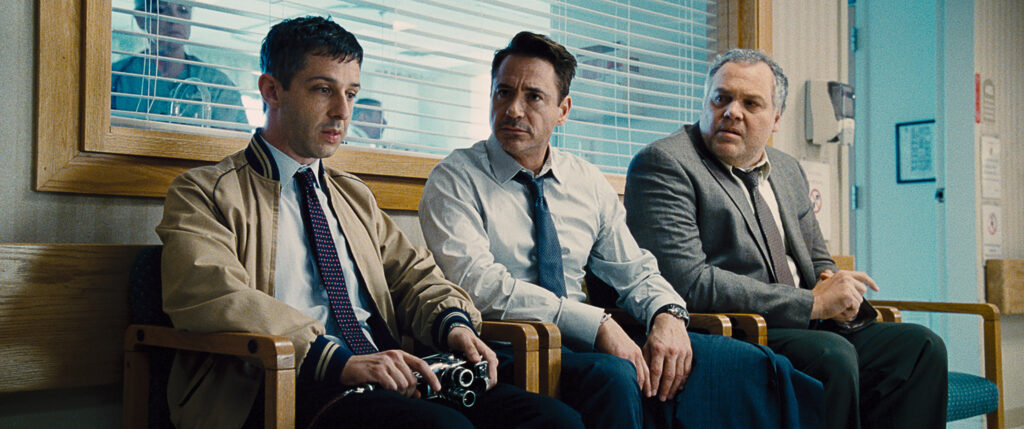
They are joined by always intriguing Billy Bob Thornton as smug prosecutor Dwight Dickham, noteworthy Vincent D’Onofrio (“Law and Order: Criminal Intent”) and Vera Farmiga, under-utilized as the girl who got away. There is also a surprising turn from Dax Shepard (“Parenthood”) as a bumbling, inexperienced trial lawyer.
What Works: While the characters each have dense backstories, this story is too sprawling. The film is at its best when focusing on the complexities of father and son relationships.
Janusz Kaminski’s cinematography has a nostalgic feel to it, warmly lit to evoke memories of days past. The score by Thomas Newman is appropriately wholesome, with the surprise of Willie Nelson singing Coldplay’s “The Scientist” over the credits
What Doesn’t Work: Director David Dobkin (“The Wedding Crashers”) is in over his head. He is heavy-handed, cramming way too much in multiple story threads, and then under-serving the genuine moments. He needed to pick a tone and stick with it, and his pacing was poor. There is no value whatsoever in being more than two hours’ long.
Vera Farmiga, as Hank’s ex-girlfriend who runs the local diner, seems to be a contrived convenience, and was extraneous to the plot.
Dobkin is responsible for the story that the screenplay by Nick Schenk and Bill Dubuque (“Gran Torino”) is based on, and felt the need to insert tornado-like weather as a metaphor. Oh boy.
Substituting picturesque Massachusetts for bucolic Indiana wouldn’t have been that jarring had it not been for the green mountains on view. Say what? Filmmakers might have researched topography of Indiana.
“The Judge” is the kind of film that is entertaining despite being emotionally manipulative. And the performances keep you watching.
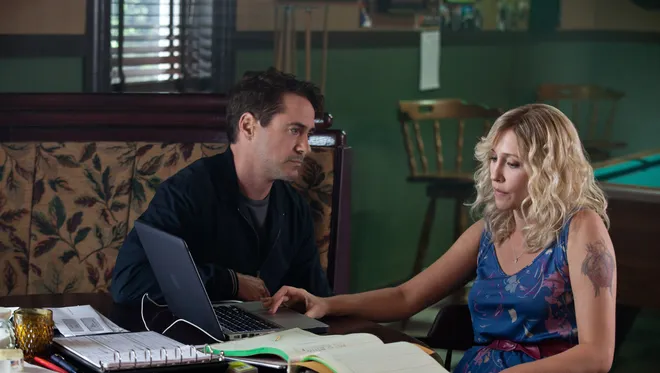
Stars: Two and a half
Director: David Dobkin
Starring: Robert Duvall, Robert Downey Jr., Billy Bob Thornton, Vincent D’Onofrio, Vera Farmiga, Leighton Meester
Rated: R for language including some sexual references
Length: 2:21

Lynn (Zipfel) Venhaus has had a continuous byline in St. Louis metro region publications since 1978. She writes features and news for Belleville News-Democrat and contributes to St. Louis magazine and other publications.
She is a Rotten Tomatoes-approved film critic, currently reviews films for Webster-Kirkwood Times and KTRS Radio, covers entertainment for PopLifeSTL.com and co-hosts podcast PopLifeSTL.com…Presents.
She is a member of Critics Choice Association, where she serves on the women’s and marketing committees; Alliance of Women Film Journalists; and on the board of the St. Louis Film Critics Association. She is a founding and board member of the St. Louis Theater Circle.
She is retired from teaching journalism/media as an adjunct college instructor.

